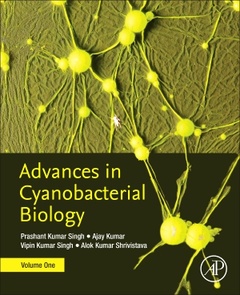Advances in Cyanobacterial Biology
Coordonnateurs : Singh Prashant Kumar, Kumar Ajay, Singh Vipin Kumar, Shrivistava Alok Kumar

Advances in Cyanobacterial Biology presents the novel, practical, and theoretical aspects of cyanobacteria, providing a better understanding of basic and advanced biotechnological application in the field of sustainable agriculture. Chapters have been designed to deal with the different aspects of cyanobacteria including their role in the evolution of life, cyanobacterial diversity and classification, isolation, and characterization of cyanobacteria through biochemical and molecular approaches, phylogeny and biogeography of cyanobacteria, symbiosis, Cyanobacterial photosynthesis, morphological and physiological adaptation to abiotic stresses, stress-tolerant cyanobacterium, biological nitrogen fixation. Other topics include circadian rhythms, genetics and molecular biology of abiotic stress responses, application of cyanobacteria and cyanobacterial mats in wastewater treatments, use as a source of novel stress-responsive genes for development of stress tolerance and as a source of biofuels, industrial application, as biofertilizer, cyanobacterial blooms, use in Nano-technology and nanomedicines as well as potential applications.
This book will be important for academics and researchers working in cyanobacteria, cyanobacterial environmental biology, cyanobacterial agriculture and cyanobacterial molecular biologists.
1. Cyanobacterial imprints in diversity and phylogeny2. Cyanobacterial Diversity: Molecular Insights Under Multifarious Environments3. Cyanobacteria in tropical and sub-tropical marine environments: Diversity, and ecological role4. Database Resources for Cyanobacterial Research5. Cyanobacterial pigment and their fluorescence characteristics6. Cyanobacterial membrane biology under stress with particular reference to photosynthesis and photomorphogenesis7. Cyanobacteria and iron homeostasis: Advancements in siderophores and metal transporters8. Molecular chaperones in protein folding and stress management in cyanobacteria9. cyanobacterial genome editing toolboxes: Recent advancement and future projections for basic and synthetic biology researches10. Impact of pesticide applications on the growth and function of cyanobacteria11. Cyanoomics: An advancement in the fields cyanobacterial omics biology with special reference to proteomics and transcriptomics12. Algae and cyanobacteria as a source of novel bioactive compounds for biomedical applications13. Cyanobacterial stress-responsive small RNAs (sRNAs): Players of stress and developmental responses14. Physiological aspects of cyanobacterial nitrogen fixation and its applications in modern sciences15. Mycosporine-like amino acids (MAAs) in Cyanobacteria: Biosynthesis, Functions and Applications16. Heterocyst and akinete differentiation in cyanobacteria: A view towards cyanobacterial symbiosis17. Cyanobacterial peroxiredoxins and its role in cyanobacterial stress biology18. Cyanobacteria as a biofuel source: Recent Advances and Applications19. Cyanobacteria as an indispensable tool for heavy metal removal from wastewater: Advancement in the field of biosorption20. Dynamics of harmful cyanobacterial blooms and their toxins: environmental and human health perspectives and management strategies21. Cyanobacteria as a source of nanoparticles: Application and future projections22. Role of algae and cyanobacteria in bioremediation: Prospects in polyethylene bio-degradation23. Cyanobacteria: Potential source of biofertilizer and synthesizer of metallic-nanoparticles24. Cyanobacteria: potential source of Anticancer Drugs25. Cyanobacteria as a source of biofertilizers for sustainable agriculture
Academics and Researchers working in cyanobacteria, cyanobacterial environmental biology, cyanobacterial agriculture and cyanobacterial molecular biologists. Microbiologists, ecologists, physiologists, environmentalists, molecular biologists, agronomists, pharmacologists and related researchers, who want to work in the field of cyanobacterial research
Dr. Ajay Kumar is currently working as a professor at Amity Institute of Biotechnology, Amity University, Noida, India. Dr. Kumar recently completed his tenure as a visiting scientist from Agriculture Research Organization, Volcani Center, Israel. He has published more than 200 research, review articles, and book chapters in international and national journals. He serves as an associate editor for Frontiers in Microbiology and as guest editor for various journals such as Plants, Microorganisms, and Sustainability. Dr. Kumar has also edited more than 40 books with the leading publishers such as Elsevier, Springer, and Wiley. Dr. Kumar’s research experience is in the field of plant–microbe interactions, postharvest management, cyanobacterial biology, and so on.
Dr. Vipin Kumar Singh is currently working as CSIR Research Associate in the Department of Botany, Centre of Advanced Study, Banaras Hindu University, Varanasi, Uttar Pradesh, India. He obtained his Ph.D. degree in Botany from the Banaras Hindu University, Varanasi, Uttar Pradesh, India in the year 2015. He has worked in the UGC project entitled “Detoxification of arsenic contaminated groundwater by transgenic eco-friendly microbes. He has more than nine years of research experience in the area of groundwater hydro-geochemistry and bioremediation approaches to
- Summarizes the various aspects of cyanobacterial research, from primary nitrogen fixation, to advanced nano-technology applications
- Addresses both practical and theoretical aspects of the cyanobacterial application
- Includes coverage of biochemical and molecular approaches for the identification, use and management of cyanobacteria
Date de parution : 02-2020
Ouvrage de 420 p.
21.4x27.6 cm



